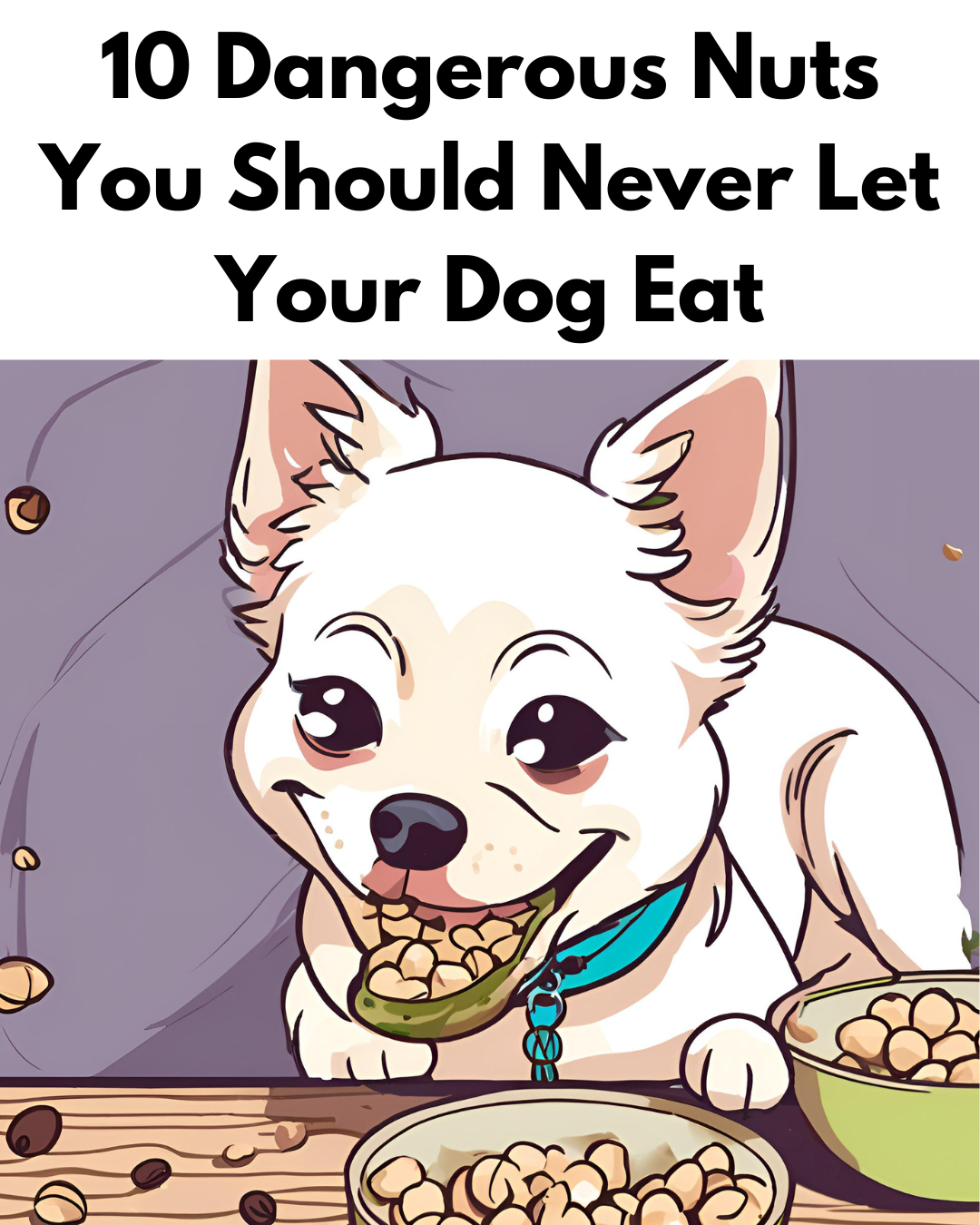Dogs have a talent for getting into things they shouldn’t, including our kitchens. While you may enjoy a healthy snack of nuts, it’s crucial to understand that not all human foods are safe for your furry friend. Some nuts can cause severe health issues, ranging from gastrointestinal distress to life-threatening conditions. Here are ten nuts you should never let your dog eat and why they pose such a danger.
1. Macadamia Nuts
Macadamia nuts are extremely toxic to dogs. Even a small amount can cause severe symptoms like weakness, vomiting, and tremors. The exact toxin is unknown, but ingestion can lead to temporary paralysis in the hind legs.
Dangers:
- Weakness
- Vomiting
- Hyperthermia
- Tremors
- Lack of coordination
Preventive Measure: Keep macadamia nuts out of reach and contact your vet immediately if ingested.
2. Walnuts
Moldy walnuts contain tremorgenic mycotoxins, which can cause seizures and neurological symptoms. Fresh walnuts can lead to gastrointestinal upset or intestinal blockage due to their size.
Dangers:
- Vomiting
- Diarrhea
- Seizures
- Tremors
- Intestinal blockage
Preventive Measure: Avoid leaving walnuts within reach and securely dispose of them.
3. Almonds
Almonds can cause significant discomfort and health issues in dogs. Their high-fat content can lead to pancreatitis, and their size can be a choking hazard or cause intestinal blockages.
Dangers:
- Gastrointestinal upset
- Pancreatitis
- Choking
- Intestinal blockage
Preventive Measure: Store almonds securely and avoid feeding them to your dog.
4. Pecans
Pecans can develop mold that produces tremorgenic mycotoxins, leading to seizures and other neurological symptoms. Their high-fat content can also cause gastrointestinal distress.
Dangers:
- Vomiting
- Diarrhea
- Tremors
- Seizures
- Pancreatitis
Preventive Measure: Store pecans securely and inspect them for mold before consumption.
5. Pistachios
Pistachios can cause gastrointestinal issues and pancreatitis due to their high-fat content. They also pose a choking hazard, especially if the shells are left on.
Dangers:
- Vomiting
- Diarrhea
- Pancreatitis
- Choking
- Aflatoxin poisoning (if moldy)
Preventive Measure: Keep pistachios out of your dog’s reach and educate family members about their risks.
6. Hazelnuts
Hazelnuts can cause significant issues due to their size and high-fat content. They can easily become lodged in your dog’s throat, posing a choking hazard or causing an intestinal blockage.
Dangers:
- Choking
- Intestinal blockage
- Gastrointestinal upset
- Pancreatitis
Preventive Measure: Store hazelnuts securely and avoid giving them to your dog as treats.
7. Brazil Nuts
Brazil nuts are extremely high in fat, which can lead to pancreatitis in dogs. Their large size also makes them a choking hazard and can cause intestinal blockages.
Dangers:
- Pancreatitis
- Choking
- Intestinal blockage
Preventive Measure: Avoid giving Brazil nuts to your dog and store them securely.
8. Cashews
Cashews can cause health issues if consumed in large quantities. They are high in fat, which can lead to pancreatitis and obesity. Additionally, cashews can sometimes contain mold, leading to aflatoxin poisoning.
Dangers:
- Gastrointestinal upset
- Pancreatitis
- Obesity
- Aflatoxin poisoning (if moldy)
Preventive Measure: Limit your dog’s access to cashews and ensure they are stored securely.
9. Pine Nuts
Pine nuts are small but high in fat, which can lead to gastrointestinal upset and pancreatitis in dogs. They can also cause an allergic reaction in some dogs.
Dangers:
- Gastrointestinal upset
- Pancreatitis
- Allergic reactions
Preventive Measure: Store pine nuts securely and avoid giving them to your dog.
10. Hickory Nuts
Hickory nuts can cause gastrointestinal upset and are prone to mold, which can produce tremorgenic mycotoxins. These toxins can lead to seizures and other neurological symptoms in dogs.
Dangers:
- Vomiting
- Diarrhea
- Tremors
- Seizures
- Intestinal blockage
Preventive Measure: Keep hickory nuts out of your dog’s reach and dispose of them securely.
Conclusion
Dogs rely on us to keep them safe, and part of that responsibility includes understanding what foods are harmful to them. While nuts can be a healthy snack for humans, they can pose serious risks to our canine companions. By being informed and vigilant, you can help ensure your dog stays healthy and happy. Remember, when in doubt, it’s always best to consult with your veterinarian about what foods are safe for your pet.


